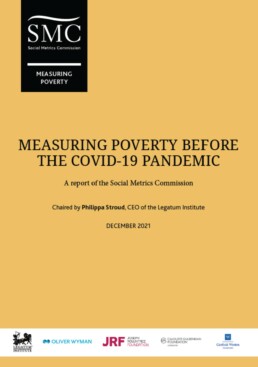The social and economic impacts of Covid-19 have been, and remain, profound. Numerous reports have demonstrated the immediate impacts on health, work and living standards for families today, alongside the longer-term impacts on children’s education and the health problems from delayed treatment which stand to have impacts for years to come.
Whilst we will need to wait many years for the full impacts to play out, upcoming “nowcasts” from the Legatum Institute can show the immediate impacts on poverty, and the context for projecting these nowcasts of poverty is provided in this latest report from the Social Metrics Commission.
Our findings show that the year immediately prior to the pandemic saw decreases in poverty as well as in financial distress, worklessness, and mental and physical ill-health amongst families in poverty. Under the Commission’s poverty measure, immediately prior to the pandemic, 13.9 million people in the UK were living in families judged to be in poverty (21% of the UK population). This means that 400,000 fewer people were living in poverty in 2019/20 than in 2018/19. These changes were driven by increasing employment, rising incomes, and reductions in housing costs that had disproportionately benefited those towards the bottom of the income distribution.
However, our research reveals that the picture was not all positive. Poverty rates remained stubbornly high for many groups, including Black and Asian families and disabled people, and poverty rates for children in larger families continued to rise. Additionally, the reductions in poverty in 2019/20, which we explore in this report, have now been reversed by the economic fallout from the pandemic. Our latest research at the Legatum Institute suggests that the economic fallout from Covid-19 significantly increased poverty; in Q2 2021, 900,000 more people were in poverty than the headline estimates from 2019/20 published in this report.
Since the founding of the Social Metrics Commission in 2016, our objective has been to develop a new approach to poverty measurement that will provide metrics that better reflect the nature and experiences of poverty in the UK and that can be used to build consensus around poverty measurement and action in the UK. With this official measure, policymakers and politicians can track progress and be effectively held to account for either tackling the causes of poverty or improving the lives of those who do experience poverty.
The results in this report, and action of the Government in the last year, provide encouragement that poverty can be reduced and that a robust measure can guide the action needed to improve the lives of those currently experiencing poverty or who, without action, would otherwise be in poverty in the future. Business leaders, policymakers, community builders, and everyone across the UK must respond in partnership with those in poverty to ensure that poverty is less of an issue in the UK after the Covid-19 pandemic than it was before.
